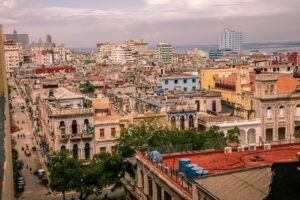Public Health Insurance in Cuba
Cuba’s public health system is a comprehensive, fully government-run, universal healthcare system. It is free at the point of delivery for all Cuban citizens and legal residents, regardless of income or employment status. The system is managed centrally by the Ministry of Public Health (MINSAP) under the National Assembly, emphasizing equity and accessibility nationwide. Primary healthcare is delivered through a community-focused “family doctor-and-nurse” program, supported by a network of polyclinics, municipal and provincial hospitals, and specialized institutes.
The public system prioritizes preventive medicine, health education, chronic disease management, and care for vulnerable populations such as the elderly and children. Services are wide-ranging—covering diagnostics, specialist consultations, maternity, emergency care, dental, and alternative therapies like acupuncture. Despite ongoing economic challenges and supply limitations largely due to longstanding U.S. sanctions, Cuba maintains equitable access to healthcare services and consistently high health indicators, underscoring the effectiveness of its universal approach.
Private Health Insurance in Cuba
Unlike many countries, Cuba does not have a traditional private health insurance market for its citizens. Instead, private health insurance in Cuba exists primarily for foreigners, tourists, and expats. Cuban law mandates that any non-resident staying longer than 30 days must have medical insurance recognized by Cuban authorities. This insurance covers emergency medical treatment, hospitalization, dental emergencies, and medical evacuation or repatriation.
Private insurance for foreigners is typically offered by international travel and expat insurance providers, such as CubaHeal and others, who provide Cuba-compliant plans tailored to the island’s healthcare regulations. These plans usually include coverage limits around $25,000 for medical expenses and repatriation costs. Foreign visitors and long-term residents access private or semi-private healthcare facilities by paying fees in foreign currency. These private services run parallel to the free public system but are not available to Cuban nationals as a market option.
Key Differences
- Coverage and Eligibility: The public system is universal and free for Cuban nationals, while private insurance is compulsory only for foreigners staying long-term, covering emergency and hospital care but requiring upfront fees or insurance proof.
- Funding: Public healthcare is state-funded through government budgets, with no direct charges to citizens. Private insurance for foreigners is paid out-of-pocket or via private insurers.
- Access: Cubans receive care through a nationwide integrated public network emphasizing community-based primary care. Foreigners accessing private care rely on international insurance and pay in foreign currency.
- Purpose: The public system focuses on comprehensive population health and preventive care; private insurance is designed to meet legal requirements for foreign visitors and provide access to private healthcare wings.
Similarities
- Both systems emphasize access to emergency care—public for nationals and private for foreigners.
- Both recognize the importance of hospitalization, specialist care, and chronic disease management.
- Preventive care and public health programs are core to the public system, while private plans for foreigners often cover preventive screenings and acute care.
- Coordination exists between public providers and private insurers when foreigners access private or semi-private services.
Top Public Health Insurance in Cuba
Overview
Cuba operates a unique public health insurance system characterized by a universal, government-run national health system. Unlike many countries where multiple public insurers exist, Cuba essentially has a single public health insurance model integrated into its universal healthcare system. This system provides free and comprehensive medical care to all Cuban citizens and legal residents without a traditional insurance premium or copayments. Here is an overview of the core features:
1. Universal National Health System (MINSAP)(Official website: https://www.sld.cu/)
Cost:
- Healthcare under the national system is free at the point of use for Cuban citizens and legal residents. There are no direct premiums, deductibles, or copays for services. The system is funded entirely by the government through general taxation.
Available Services / Coverage Features:
- Comprehensive medical coverage including primary care, specialist consultations, hospitalization, emergency care, maternal and child health, vaccinations, dental care, mental health services, and alternative medicine like acupuncture and nutrition counseling.
- Extensive preventive care programs, chronic disease management, elderly care, and health education.
- A tiered service delivery system with family doctor-and-nurse teams providing first-contact care, supported by polyclinics and hospitals for diagnostics, specialist treatment, and advanced care.
- Free emergency care universally available for all citizens.
Open for All or Limited:
- Open universally to all Cuban citizens and legal residents, with equal access regardless of income, employment, or geographic location.
- Services extend nationwide, including rural and remote areas, ensuring equitable healthcare access.
Core Financial Features:
- Entirely state-funded, no direct payments required at service point.
- No health insurance premiums or co-pays.
- Budget allocated annually by the government to the Ministry of Public Health (MINSAP) to maintain infrastructure, staffing, medicines, and equipment.
- Patients do not bear financial risk; the government covers all operational costs.
Consumer Satisfaction Score:
- Although formal consumer satisfaction surveys are limited in Cuba, available reports and international assessments indicate high public trust and satisfaction with the accessibility and quality of primary care services.
- Cuba’s health indicators (life expectancy, infant mortality) are among the best in the developing world, reflecting effective healthcare delivery.
- The emphasis on preventive care and community-based services contributes positively to citizen satisfaction.
Private Health Insurance in Cuba: Key Providers and Features
Overview
Cuba does not have a broad or fully developed domestic private health insurance industry for its citizens. Instead, private health insurance in Cuba is mainly tailored for international travelers, diplomats, expatriates, and foreign residents, often offered by foreign insurance companies or in partnership with Cuban state institutions. These policies cover care in international clinics, emergency services, and repatriation, rather than general healthcare for Cuban citizens.
Below are the most notable options for private insurance relevant to those living in or visiting Cuba.
1. ASISTUR (Asistencia al Turista S.A.)(Official website: http://www.asistur.cu/)
Cost:
- Varies based on nationality, age, length of stay, and coverage options. Average: $3–$10 per day.
Available Services / Coverage Features:
- Emergency medical services
- Hospitalization and surgery
- Medical evacuation and repatriation
- Support in case of travel disruption due to medical issues
- Assistance in case of accidents, theft, or legal issues
Open for All or Limited:
- Available only to foreign visitors or Cubans returning from abroad temporarily
- Not available to average Cuban citizens residing permanently in Cuba
Core Financial Features:
- Premiums paid upfront before or upon entering Cuba
- Policies often linked with visas or travel packages
- No long-term payment or credit options
Consumer Satisfaction Score:
- Generally moderate to high satisfaction among travelers
- Praised for fast coordination with international clinics, though services may vary depending on local healthcare facility availability
2. ESICUBA (Seguros Internacionales de Cuba, S.A.)(Official website: https://www.esicuba.cu/)
Cost:
- Plans typically range from $2–$15/day depending on risk and services chosen
- Special plans available for journalists, diplomats, long-term visitors
Available Services / Coverage Features:
- Comprehensive travel and health insurance
- Emergency care, hospitalization, specialist services
- Medical evacuation and dental emergencies
- Repatriation of remains
- Legal and baggage assistance
Open for All or Limited:
- Tailored primarily for foreign nationals, business travelers, diplomatic staff, and some non-resident Cubans
- Not open to Cuban citizens living in Cuba permanently
Core Financial Features:
- Insurance must be purchased prior to or upon arrival
- Short-term and mid-term policies available, depending on the duration of stay
- Government-affiliated agency, allowing smoother hospital and clinic access
Consumer Satisfaction Score:
- Rated as efficient and trustworthy among users, especially for diplomatic and long-term visitor needs
- Some complaints around bureaucracy in claim processing
3. International Health Insurance via Foreign Providers (e.g., Bupa, Cigna Global)(Official websites: https://www.bupa.com/, https://www.cignaglobal.com/)
Cost:
- Typically $100–$500+ per month, depending on age, condition, and coverage level
Available Services / Coverage Features:
- Worldwide coverage including in Cuba (if recognized by local clinics)
- Emergency care, hospital stays, outpatient treatment
- Optional coverage for dental, vision, maternity, mental health
Open for All or Limited:
- Open to foreign nationals, expats, and wealthy Cubans with foreign income or dual citizenship
- Must be arranged outside Cuba; not commonly sold or serviced within the country
Core Financial Features:
- Premiums paid directly to international insurer
- May offer annual deductibles, coinsurance, and multiple plan tiers
- Direct billing is not always available; reimbursement often required
Consumer Satisfaction Score:
- High satisfaction with service levels, but limited in-network facilities in Cuba
- Some complaints about claim delays or reimbursement issues
Summary Table
| Provider | Cost | Coverage Type | Availability | Consumer Score |
| ASISTUR | $3–$10/day | Emergency, repatriation, legal help | Foreign visitors, travelers | Moderate–High |
| ESICUBA | $2–$15/day | Comprehensive travel & emergency health | Visitors, diplomats, expats | Moderate–High |
| Bupa / Cigna Global | $100–$500+/month | Global health (includes Cuba coverage) | Expats, dual citizens, foreign elite | High (limited network) |
READ MORE: Private and public health insurance of Antigua y Barbuda (Make informed choices)


